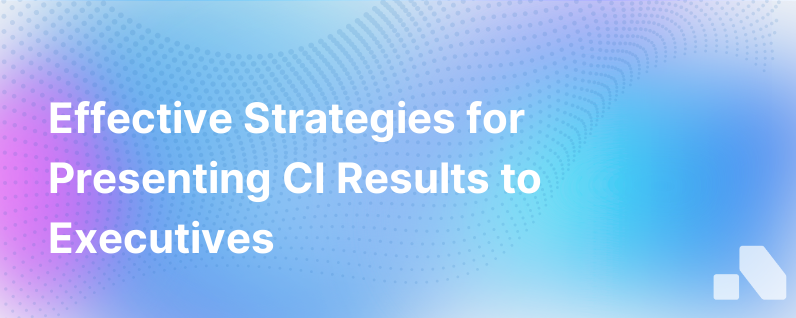
In today’s data-driven world, Competitive Intelligence (CI) is a powerful tool that can provide companies with valuable insights about their market, competitors, and customers. However, the work of gathering and analyzing CI can be undermined if these insights are not effectively communicated to senior leadership.
The challenge for CI professionals is to present their findings in a way that informs strategic decision-making, influences organizational direction, and ultimately, proves the value of CI initiatives. Here, we provide a comprehensive guide on presenting CI results to senior leadership effectively.
Understanding Your Audience
The first step in presenting CI results is understanding your audience - the senior leadership. Remember, they are inundated with data every day, so distilling what is critical for them is paramount. Understanding the focal points of your organization’s strategy, its decision-making framework, and the key obstacles will help make your presentation more attuned to the needs of leadership.
Structuring Your Presentation
Effective presentation of CI results hinges on a well-structured and clear layout of information. Here's a proposed structure for your presentation.
Executive Summary: Use this section to give an overview of the outcomes and implications of your CI activities. Although this section comes first, it should be prepared last. Spend considerable time crafting this section as it's crucial in grabbing the audience’s attention and convincing them of the importance of the presented data.
Purpose and Background: Clearly, state the objectives of your CI activity. Discuss why it was undertaken and what questions it was designed to answer. Providing this context is essential to align the audience to the following content.
Results and Insights: Share the hard data collected and analyzed during the CI activity. Only include the most critical findings and take care not to overload with unnecessary details. Summarize each chart, graph, or table presented and clarify its significance and implications.
Key Analytical Insights: This is where you distill the implications of the results. Discuss both the challenges and opportunities identified by the CI results and their impact on the existing strategy.
Action Steps and Recommendations: Outline the recommended strategic actions according to key insights. Senior leaders are especially interested in clear action plans that can be incorporated within existing strategic frameworks.
Tailoring the Message
The message you present needs to do two things; firstly, it should align to the broader goals of your organization, and secondly, it should stress how CI insights can help achieve those goals. More importantly, they want to know the specific actions to be taken, based on those insights.
Choosing the Right Presentation Medium
The medium you choose to present your CI results is just as important as the content. While PowerPoint presentations are a go-to option, consider alternative forms like dashboards, interactive reports, summarised infographics, and decision-support tools that allow leaders to interact and engage with the data.
Practicing Delivery
Delivery matters as much as content. Practice your delivery multiple times to ensure your message is clear, concise, and engaging. Use visual aids to help clarify complex data. Pause for questions or comments. This can boost audience engagement and improve their comprehension of the CI results.
Achieving Buy-in with the 'So What' Principle
Remember, the goal is not just to inform but to influence. Present your findings and follow up each point with the 'so what?' principle — explaining why the leaders should care about this piece of data — and translate the implications as clearly as possible. This makes your data relevant and actionable, hence achieving the desired buy-in.
Leveraging AI
In today's increasingly complex and fast-paced business environment, traditional methods of collecting and analyzing CI data may fall short. This is where AI tools like Aomni can help. Aomni uses AI to automate the labor-intensive process of data collection, ensures real-time updates of CI data, and impressive data visualization capabilities. This can make your CI presentation more current, comprehensive, and visually engaging.
Conclusion
Presenting CI results to senior leadership is an art. It requires a deep understanding of your audience, a well-structured presentation, a tailored message, effective delivery, and the right tools. Done correctly, your CI presentation can yield strategic insights, influence decision-making, and underscore the value of CI to your organization, proving critical in setting the strategic direction for the future. Tools like Aomni can assist you by providing real-time CI data in a user-friendly and visually engaging manner, helping you make a bigger impact in your presentations.